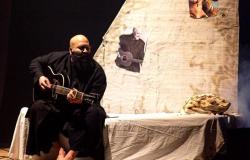
The referendum of 2 June 1946 represented the first case of universal suffrage in Italy, with the granting of the vote to women too. Over 90% of women showed up to vote, 12,998,131, compared to 11,949,056 men. One week before the elections, history reminds us how important it is to go and vote.
I imagined this Farinél as soon as I finished watching “There’s Still Tomorrow”, the record-breaking film, written and directed by Paola Cortellesi. The date circled on the calendar is that June 2nd that we live in today and that we often take for granted but which the film in question brings back to its true dimension.
There is a before and an after in the history of Italy and, although we cannot know it or even prove it, it is probable that the difference that allowed the Republic to overcome the Monarchy, the progress to overcome secularism, is largely linked to the vote for women.
The end of an archaic world and the beginning of the future that will lead to an economic boom and above all to peace because it is clear that women are naturally less inclined to war than men, as history shows.
In 1946, at the end of the war, it was decided that all Italian citizens over the age of 21 and of both sexes could participate in the vote: one of the major innovations was precisely that, for the first time, in Italy, even women they were able to go to the polls and express their preference.
The turnout was very high: those entitled to vote were in fact 28,005,449, and there were 24,946,878 voters (89.08%). The valid votes were 23,437,143. Of these, 12,718,641 (equal to 54.27%) expressed their opinion in favor of the Republic, 10,718,502 (equal to 45.73%) in favor of the monarchy.
The members elected to the Constituent Assembly were 556, of which only 21 were the “Constituent Mothers”.
That number has grown, but a lot still remains to be done because 78 years later Italy has never had a female president of the Republic and I think that for after Mattarella, a president who will be remembered for a long time, it is necessary to identify a female figure to lead of a Republic born thanks to the vote of women. And I underline thank you.
Immediately after the proclamation of the results of the referendum, the now ex-monarch Umberto II left Italy to join his family in exile in Portugal. The transition from Monarchy to Republic took place in a climate of tension, between controversies on the regularity of the Referendum, accusations of fraud, appeals and complaints. Following the results and evaluations of the appeals, on 18 June 1946 the Court of Cassation officially proclaimed the birth of the Italian Republic. On 25 June the work of the Constituent Assembly began, which on 28 June elected Enrico De Nicola as the first provisional Head of State.
On 1 January 1948 the new Constitution of the Italian Republic came into force. The most beautiful and copied in the world.
And the numbers of the 1946 vote are a warning one week before the electoral round which promises to have the lowest turnout ever with one in two Italians who could take the side of not voting.
For this reason, I invite you to watch “There’s Still Tomorrow”, an important film, which brings back to its true dimension not only the vote for women, but universal suffrage in general because it reminds us that it is a right that is not taken for granted and does not fall from the sky, but is a hard-earned one. , longed for, awaited.
In those long queues to go to the polls there is the rebirth of a country, of a peninsula which, together with Greece and the Middle East, was the cradle of civilization and the cradle of culture and knowledge. It is up to us, with war upon us, with winds of extremism blowing across Europe, at a time when there is a need for more Europe, more culture, more history, to go and vote and try to vote while defending our fundamental rights.
Otherwise it will not be legitimate to complain.





